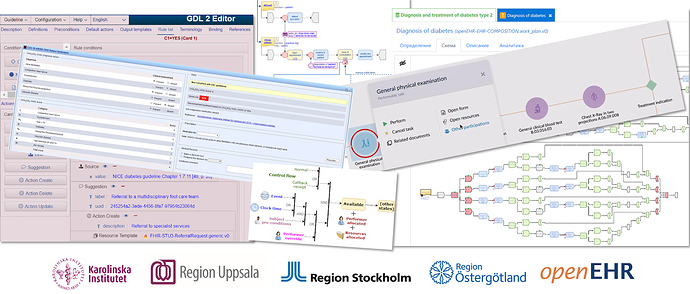Practical tools and methods for clinical decision- and process-support
Update March 12: This seminar was previously planned as a physical event in Stockholm and has now been changed to an online event.
*Update March 30: The video recording is now available
What
Public seminar demonstrating and discussing applications of decision support and process support using openEHR-based tools and methods. Such applications can be created and maintained in an open way that is practically adjustable to be patient-specific and integrated across organisations and IT-systems using e.g. openEHR, HL7 FHIR or ISO13606. The seminar gives an update regarding state of the art of the international openEHR “Guideline Definition Language” and “Task Planning” specifications. The specifications are maintained by the international openEHR specification editorial committee (SEC) that meets in Stockholm March 25-27 to focus on the future directions for this. The SEC is interested in feedback, needs and ideas from seminar participants.
Programme with links to slides and references.
When
Thursday March 26, 2020.
- Online meeting open for connection & test from 16:00 CET (Stockholm timezone)
- Seminar 16:15 - 18:15 CET (Stockholm timezone)
Who
Anybody interested in the topic is welcome to join, for example clinicians, technical staff and informaticians interested in designing, implementing and maintaining decision- and process-support.
Registration
Please register (for free) at: https://forms.gle/1WFepvP1oF8duHEQ9
Connection links and instructions
We now got an offer from Nedap to be primary host and have switched the liu-se alternative to become a backup plan (again).
Primary meeting alternative
You are invited to a Zoom webinar.
When: Mar 26, 2020 04:00 PM Amsterdam/Stockholm (16:00 CET Login/setup, 16:15 CET Presentation starts)
Topic: Practical tools and methods for clinical decision- and process-support
Please click the link below to join the webinar via Zoom app or via modern web browser:
Alternatively you can join using the search bar in Skype for business with 281-953-142@lync.zoom.us
Or Telephone:
Dial(for higher quality, dial a number based on your current location):
- Netherlands: +31 20 794 0854 or +31 20 794 7345 or +31 20 241 0288
- US: +1 669 900 6833 or +1 929 436 2866 or +1 253 215 8782 or +1 301 715 8592 or +1 312 626 6799 or +1 346 248 7799
- Sweden: +46 8 5052 0017 or +46 850 539 728 or +46 8 4468 2488
- Norway: +47 2396 0588 or +47 7349 4877
- Germany: +49 695 050 2596 or +49 69 7104 9922 or +49 30 5679 5800
- United Kingdom: +44 208 080 6592 or +44 330 088 5830 or +44 131 460 1196 or +44 203 481 5237 or +44 203 481 5240 or +44 208 080 6591
- Finland: +358 3 4109 2129 or +358 9 4245 1488
- Portugal: +351 308 804 188 or +351 308 810 988
- Slovenia: +386 1600 3102 or +386 1888 8788
- Japan: +81 3 4578 1488 or +81 524 564 439
- Spain: +34 91 787 0058 or +34 917 873 431 or +34 84 368 5025
- Australia: +61 3 7018 2005 or +61 8 7150 1149 or +61 2 8015 6011
If connected via phone/skype/sip you may need to enter Webinar ID: 281 953 142
Other international phine numbers available: https://nedap.zoom.us/u/adUKuZsiS8
Or iPhone one-tap :
- Netherlands: +31207940854,281953142# or +31207947345,281953142#
Backup meeting alternative (only if the above crashes/fails)
https://liu-se.zoom.us/j/277726484 see details and Skype/phone/SIP alternatives below
Organized by
Karolinska Institutet, openEHR International, Region Stockholm, Region Uppsala and Region Östergötland are organizing this event in order to build knowledge about some of the modeling and tooling options based on the openEHR family of specifications and standards.
A printable PDF-version of the original invitation (with previously physical and thus wrong location):
Process and decision support - openEHR seminar March 26.pdf (214.4 KB)
Questions and comments?
Feel free to ask questions or comment here below by replying in this thread right here in openEHR’s forum.


